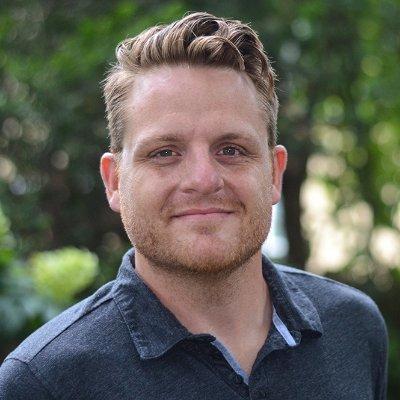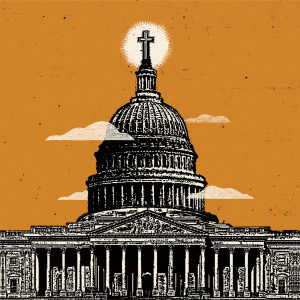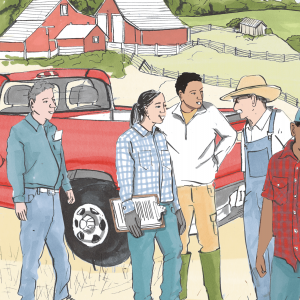
Matthew Hildreth, who grew up on a small farm in eastern South Dakota, is the executive director of RuralOrganizing.org.
Posts By This Author
How Christians Can Counter Christian Nationalism
Scholars, pastors, and activists on hopeful action to undo this heretical belief system.
WEAPONIZED CHRISTIAN NATIONALISM seeks a “Christian” government that would erode civil rights and undercut election integrity and democratic principles. It endorses the use of violence to obtain or maintain power; embraces white supremacy; and distorts Christian language, symbols, and identity into tools for political manipulation and gain.
At the same time, beliefs about “God and country” exist on a wide spectrum. White Christian nationalism is sometimes supported by people who are not white. And stifling all participation by people of faith in public life is not a suitable alternative to nationalism.
In other words: It’s complicated. You’re not alone if you are confused, concerned, or dismayed by these topics. But hopeful action is possible. The following short essays by scholars, pastors, and activists offer insights on Christian nationalism and how to dismantle it. —The Editors
Prophetic Faith
by William J. Barber III
IF FAITH WERE not powerful, people in power would not invest so much to manipulate it for their own interests. When we oppose Christian nationalism, we must begin with a recognition of the power of faith.
Faith has the power to bring us together and build up a democracy where everyone can thrive. Every movement toward a more perfect union in our nation’s past has been powered and sustained by deep faith traditions. We need to learn from the faith of Frederick Douglass, Sojourner Truth, and William Lloyd Garrison; Martin Luther King Jr., Dorothy Day, and Ella Baker. This rich theological heritage helps us guard against the forces that distort Christianity to justify extremism. But it also prepares us to practice prophetic faith in our own lives and ministries.
“Woe unto you who legislate evil and rob the poor of their right,” the prophet Isaiah declares. In his first sermon, recorded in Luke 4, Jesus takes up Isaiah’s scroll to proclaim “good news to the poor.” Any alternative to the religious nationalism that calls itself “Christian” must embody this prophetic proclamation for the 135 million Americans who are poor or low-income today. As the divide between the super-rich and the poor has grown wider in the U.S. over the past half century, poor communities have been offered divisive culture wars and the false hope of an individualistic prosperity gospel.
In a time of extreme inequality, Ezekiel says God looked for someone to stand in the gap but found none. Several chapters later, though, God sends Ezekiel to prophesy to a valley of dry bones. There Ezekiel witnesses the power the rejected have when they come together and rise up as a nonviolent army.
Poor people in the United States today are the largest swing vote in national elections. If they unite around an agenda, they have the power to reconstruct American democracy. God has seen fit to ordain those who have been rejected in this world to lead the revival of love, justice, and mercy that we so desperately need. We embody an alternative to religious nationalism when we join God in this work.
‘White, Conservative, and Dumb’—and Other Lies About Rural America
How rural organizers are building change in their communities by focusing on what politicians ignore: relationships.
IT WAS COLD — even for northwest Iowa in November. And I was late.
I thought I could make up time if I took the back way, a route I’d driven many times before. But the one-lane bridge across the Rock River was out and, judging by the abandoned construction site, it hadn’t been open for a while. I had moved away four years earlier and was a little behind on local traffic patterns.
To locals, the region surrounding the Big Sioux River drainage basin—stretching across parts of Iowa, Nebraska, South Dakota, and Minnesota—is known as “Siouxland.” To most Americans, this is flyover country.
I grew up in Siouxland, crisscrossing the region for family gatherings, 4-H horse shows, and trail rides, but I knew my time there was limited. Through TV, I learned about life in the big city and what the rest of the country thought of hicks, hillbillies, and hayseeds like me. I learned that to be successful, I had to leave. And so, like many of my classmates, I left as soon as I could.
I went to college in Minneapolis and pursued a career in media; after graduation I spent time in Los Angeles, New York, and Washington, D.C., working on shows such as Monday Night Football and Good Morning America.
But on the morning of May 12, 2008, everything changed: Hundreds of federal agents from Immigration and Customs Enforcement raided an Iowa meatpacking plant, arresting 389 community members. At the time, I was a media producer for Sojourners, so I traveled to Iowa to cover the humanitarian response organized by Sister Mary McCauley, parish administrator of the local Catholic church.
Within hours of the raid, Sister McCauley had the entire community of 2,269 residents organized. When I interviewed her a few days later, the church was full of children still waiting to be reunited with their families. The church’s fellowship hall was filled with clothes, meals, and supplies for the children; community volunteers worked through legal paperwork on behalf of those detained. In a moment of complete chaos, community members rose to the challenge and stood together with their neighbors. It was at this point I realized the power of rural organizing. I was hooked.
Leveraging the gifts of the community
IN MARCH, AS the pandemic caused by the novel coronavirus erupted around the world, rural hospitals in the U.S. faced a particularly grim reality: Like hospitals across the nation, they faced a shortage of personal protective equipment such as N-95 masks and gowns. But unlike their urban and suburban counterparts, rural hospitals were already struggling. According to a 2017 study, 41 percent of rural hospitals operate at a loss, a result of decreasing Medicare reimbursements, more patients with underlying conditions, and fewer patients with private insurance. “We’re stretched thin as it is,” one hospital CEO told the Washington Post. “We’ll improvise and make it work however we can.”
As cases of COVID-19 skyrocketed, I thought about McCauley and all the organizers like her that I’ve met in the 12 years since the Postville immigration raid. Many of the best community organizers I know would never give themselves that title. They don’t work for a campaign or an organization. Often, they’re just everyday folks who believe their community is worth fighting for.
Fast for Families: Voters in Steve King’s District Thank Immigration Fasters
As the least productive Congress in history begins to wind down its first legislative session, immigration reform is coming to a boil.
It’s already been 160 days since the Senate passed its immigration bill and the House already has 191 co-sponsors on its bipartisan bill. Still, House Republicans have failed to take the next step and have only voted on one immigration provision so far this year — Steve King’s (R-Iowa) amendment to defund DACA and deport DREAMers.
And with King (most famous for saying young immigrants have “calves the size of cantaloupes” from lifting 75 pound bags of drugs across the border) at the helm for Republicans on immigration, it’s no wonder that they’re getting nowhere on immigration.
But the tragic irony of all of this is that King’s own constituents (myself included) overwhelmingly support immigration reform. Recent polling by The American Action Network, a conservative outside group, shows that 79 percent of voters in his district support the tenets in the Senate Gang of Eight bill. Despite that popularity, King and his shrinking list of allies in the House have kept Speaker John Boehner (R-Ohio) from addressing the moral crisis afflicting millions of workers, children, mothers, and fathers.
Faith Leaders Target Alabama's Immigration Bill With Ad
Yesterday, a diverse group of faith leaders in Alabama released a television ad targeting Alabama's HB 56 -- the worst anti-immigrant law in the country.
The 30-second ad features Rev. Steve Jones, senior pastor at Southside Baptist Church in Birmingham.
''We believe in reaching out and ministering to our community. Yet under Alabama's immigration law, we could be prosecuted for following God's call to be good Samaritans,” Jones says in the ad.
Watch:
Native Americans vs. Nazi Sympathizers: The Bizarre Backstory on Changing an Offensive University Mascot
Video Interview with David Bazan
Since 1994, David Bazan has put sharp questions about faith, justice, and his Pentecostal-evangelical upbringing front and center in his songs.
An Interview with Morgan Spurlock
Documentary filmmaker Morgan Spurlock is not afraid to get messy.
Video Interview with Don Miller
Don Miller is the founder of The Mentoring Project and author of
Watch a How-To Video on Composting with Worms
Video Interview with Michael J. Sandel
Harvard professor Michael J. Sandel is used to playing to large crowds—his undergraduate course on justice enrolls more than 1,000 students each year.
How To Build a Memorial Prayer Altar
Ed Spivey Jr's Latest H'rumphs Video
With all the mixed signals we've been getting these days about the use of torture, it's hard to know what to believe.
H'rumphs Video with Ed Spivey Jr.
Ed Spivey Jr., Sojourners magazine's award-winning art director and humor columnist, laments his rapidly shrinking newspaper and considers the future of the 24-hour news cycle.
H'rumphs Video
I hold in my hand a printout of the e-mail I just received from Barack Obama.
Ed Spivey Jr.'s H'rumphs Video
Vote in the M2EP FilmMaker Challenge
In preparation for the upcoming Mobilization to End Poverty on April 26th - 29th, Sojourners and World Vision have launched their first ever http://www.sojo.net/index.cfm?action=events.M2EP&item=M2EP-filmmaker


